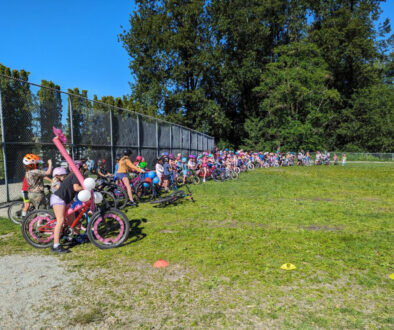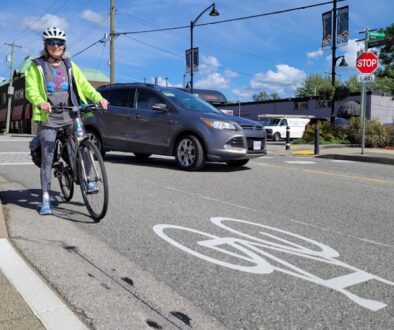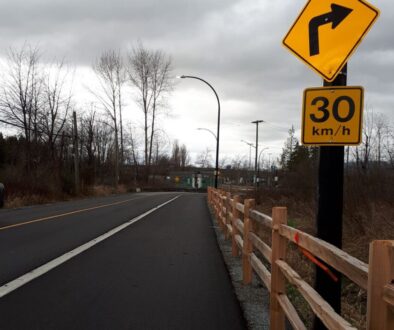Lecture: How to Increase Cycling and Walking – Lessons from Cities Across the Globe
You don’t want to miss this: if you’re not able to attend the lecture by John Pucher at SFU Vancouver Campus on June 14 in person, it will be webcast! He’s very inspiring, and it’s absolutely worth listening to what he has to say.
For all those of us in Maple Ridge who sometimes really need some hope and inspiration!
PUBLIC LECTURE
Free Lecture with Live Webcast
How to Increase Cycling and Walking—Lessons from Cities Across the Globe
Friday, June 14, 2013, 7 pm
SFU’s Vancouver campus (Harbour Centre)
515 West Hastings Street, Vancouver
Room 1400
Admission is free, but reservations are required. Reserve here.
This lecture will also be webcast live. View the live webcast here on June 14:
Free Lecture with Live Webcast
How to Increase Cycling and Walking—Lessons from Cities Across the Globe
Friday, June 14, 2013, 7 pm
SFU’s Vancouver campus (Harbour Centre)
515 West Hastings Street, Vancouver
Room 1400
Admission is free, but reservations are required. Reserve here.
This lecture will also be webcast live. View the live webcast here on June 14:
http://creative- services. sfu.ca/broadcast
Comment and tweet your questions during the webcast using hashtag #SFUcycle
In this talk, John Pucher will document the boom in cycling in both European and North American cities. Adding to his previous talks, John will discuss how cycling can thrive even in cities with no history or culture of daily, utilitarian cycling, but only if government policies provide safe, convenient, and pleasant cycling conditions. He’ll also address the fact that similarly, government policies are key to encouraging walking and making it safer. Safe infrastructure is a prerequisite, but it must be complemented by many other supportive measures.
The hopeful message is that almost all Canadian and American cities are on the right path. Dozens of cities throughout North America have more than doubled levels of cycling since 1990, and some large cities such as Chicago, Portland, Minneapolis, San Francisco, and Washington, DC, have more than quadrupled the bike share of work commuters since 1990. Virtually all North American cities have plans for expanding their cycling networks, combined with a range of complementary programs such as bike sharing, bike-transit integration, safe routes to schools, mass car-free street events (ciclovias), and better training of both motorists and cyclists. Even in the American southeast, which currently has the lowest rate of cycling, many cities are installing cycle tracks, bike lanes, and bike parking.
In short, North American cities have already made considerable progress in raising both cycling and walking levels, but far more needs to be done. With over 40 percent of all bike trips shorter than two miles, there is great potential for further growth. It is crucial to convey to the media, the public, and politicians the enormous economic, social, environmental, and health benefits of walking and cycling, both to individuals and to society as a whole.
At the conclusion of his talk, John will discuss several approaches to implementing the necessary policies to increase walking and cycling while also making them safer. Public information campaigns, combined with advocacy and coalition-building, are obviously crucial, but there are other implementation strategies that can be used to enhance public and political support. Perhaps the most effective strategy of all is to make cycling and walking possible for everyone, and, in particular, to get more seniors, children, and women on bikes and on their feet. Broadening the base of public support for walking and cycling is key to getting the necessary political support and funding for the measures necessary to promote walking and cycling in our cities.
Comment and tweet your questions during the webcast using hashtag #SFUcycle
In this talk, John Pucher will document the boom in cycling in both European and North American cities. Adding to his previous talks, John will discuss how cycling can thrive even in cities with no history or culture of daily, utilitarian cycling, but only if government policies provide safe, convenient, and pleasant cycling conditions. He’ll also address the fact that similarly, government policies are key to encouraging walking and making it safer. Safe infrastructure is a prerequisite, but it must be complemented by many other supportive measures.
The hopeful message is that almost all Canadian and American cities are on the right path. Dozens of cities throughout North America have more than doubled levels of cycling since 1990, and some large cities such as Chicago, Portland, Minneapolis, San Francisco, and Washington, DC, have more than quadrupled the bike share of work commuters since 1990. Virtually all North American cities have plans for expanding their cycling networks, combined with a range of complementary programs such as bike sharing, bike-transit integration, safe routes to schools, mass car-free street events (ciclovias), and better training of both motorists and cyclists. Even in the American southeast, which currently has the lowest rate of cycling, many cities are installing cycle tracks, bike lanes, and bike parking.
In short, North American cities have already made considerable progress in raising both cycling and walking levels, but far more needs to be done. With over 40 percent of all bike trips shorter than two miles, there is great potential for further growth. It is crucial to convey to the media, the public, and politicians the enormous economic, social, environmental, and health benefits of walking and cycling, both to individuals and to society as a whole.
At the conclusion of his talk, John will discuss several approaches to implementing the necessary policies to increase walking and cycling while also making them safer. Public information campaigns, combined with advocacy and coalition-building, are obviously crucial, but there are other implementation strategies that can be used to enhance public and political support. Perhaps the most effective strategy of all is to make cycling and walking possible for everyone, and, in particular, to get more seniors, children, and women on bikes and on their feet. Broadening the base of public support for walking and cycling is key to getting the necessary political support and funding for the measures necessary to promote walking and cycling in our cities.
About the speaker:
John Pucher has been a professor at Rutgers University since 1978, conducting research on transportation economics and finance, urban travel behaviour, transportation systems, and government policies in the United States, Australia, Canada, and Europe. Over the past 15 years, Pucher’s research has focused on walking and bicycling, and how to improve their safety and convenience for all age groups, women as well as men, and people of all levels of physical ability. Pucher encourages walking and cycling for recreation as well as for practical trips to work, school, and shopping to increase physical activity and to help people have healthier lifestyles. He has
published three books and over 100 articles in academic and professional journals. His most recent book is called City Cycling (edited by Pucher and Buehler, MIT Press 2012).
He has spent several years as a visiting professor at universities in Germany, the Czech Republic, Canada, and Australia, and he is spending the first half of 2013 as visiting professor at the University of North Carolina at Chapel Hill, in the state where he grew up.
John Pucher’s website
Sponsors
We gratefully acknowledge support from our sponsors:
Urban Systems
City of Vancouver
TransLink
Host
SFU Continuing Studies (City Program)
Partners
HUB-Your Cycling Connection


